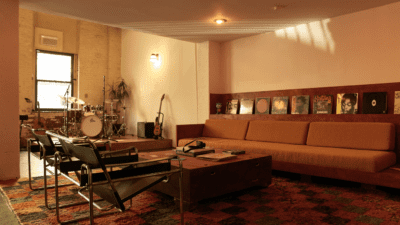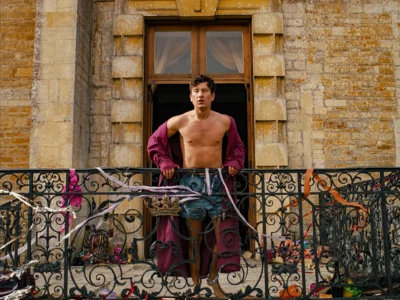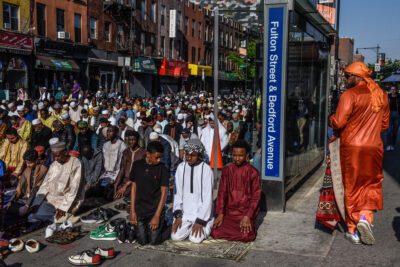Photo illustration by Johansen Peralta
The ‘criminal’ mind of Gersh Kuntzman
The editor of Streetsblog NYC is on a viral vigilante mission to call out people who tamper with their license plates. But why?
Like what you’re hearing? Subscribe to us at iTunes, check us out on Spotify and hear us on Google, Amazon, Stitcher and TuneIn. This is our RSS feed. Tell a friend!
If you are a driver of a certain selfishly delinquent orientation, you might not think every law pertains to you. You might, for example, tamper with your license plate in order to avoid detection by toll booths, speed and red-light cameras. Maybe you scratch off a few letters. Maybe you obscure the plate with a camera-proof plastic shield. If you are one of these people, sorry, you’re kind of a jerk. And Gersh Kuntzman is coming for you.
Kuntzman is a career journalist, a former Brooklyn Paper editor and columnist for the Daily News and New York Post, and editor the website Streetsblog NYC. (It’s good stuff; check it out.) He’s a somewhat ubiquitous Brooklynite-about-town. And he is a license plate vigilante.
If you follow him on Twitter, you’ve noticed that since November he’s been biking all over the city on the lookout for license plates that have deliberately been tampered with. Armed with a camera, a catchy theme song, Sharpies and a screwdriver, he films himself making the plates street-legal again by coloring in the scratched off numbers, flattening out folded up plates and such. It is an act of defiant criminal mischief.
This week, Gersh Kuntzman is our guest on “Brooklyn Magazine: The Podcast.” The license plate Avenger has been written up in the New York Times and the New Yorker for his quasi-legal efforts to bust scofflaw drivers. And it turns out a significant percentage of the folks who are illegally tampering with their plates are law enforcement officers. Kuntzman calls shames and names, posts their salaries and photos, and miraculously hasn’t gotten his ass kicked. Yet.
We talk about what drives him and … who he is anyway, biking in the city, his media career, that unique name of his and more.
This interview has been edited for concision and clarity. You can listen to it in its entirety in the player above or wherever you get your podcasts.
Can you just walk us through what it is you do for people who may not know?
If you’ve been around just walking around the streets of New York for any amount of time, you do see defaced plates, covered plates, people who put leaves on their plates, anything to block the cameras from seeing the numbers on the plate. Now I work for Streetsblog. We write about this topic all the time. But it really hit a head a couple of months ago when a lawyer friend of ours got arrested for un-defacing someone’s plate.
In this case, a guy had put a piece of plastic covering one of the letters on the plate. And as a result, my friend was biking by, and he saw the plastic, and he moved the plastic off of the letter back onto the frame of the plate so that it wouldn’t obscure the letter. And unfortunately for my friend, the driver of the car was still in the front seat of the car. And as a result, he jumped out and said, “What are doing to my car?” And he said, “Well, I’m fixing your plate.” And this guy, who happened to be some sort of security officer in a town in Nassau County, called the cops, and the cops showed up and actually arrested my friend rather than arresting or summonsing the guy with the defaced plate, which as you know is illegal.
So our friend was charged with criminal mischief, which is ostensibly a graffiti charge. Now the arrest was obviously traumatic for our friend, but the charges were in fact dropped by the Brooklyn district attorney. Now I thought the whole thing was funny, so I wrote a folk song about it, which you can hear online. It’s called Criminal Mischief.
Is it essentially the theme song for your Twitter feed or, at least, the videos that you post of yourself.
It wasn’t initially going to be that way at all. I really just wrote the folk song, because I thought it was funny, in a Bob Dylan-esque sense. Dylan would write these songs about major crimes against humanity, and injustice and all that, like “Hurricane” and “The Lonesome Death of Hattie Carroll.” I just thought I’d write a funny song about a guy getting arrested for criminal mischief. It was almost like an “Alice’s Restaurant” kind of thing. And I started going around undefacing all these people’s plates for the purpose of actually getting arrested.
You’re saying you’re doing this to get arrested?
Well, no, I’m not actively trying to get arrested, because I think that’d be stressful and probably wouldn’t look good if I’d want to have any future journalism career. But the goal is to shine a light on how little is being done by the political and legal establishment in this city to crack down on this. So I figured, at the very least, I should document as many cases of plate covering as I could. And frankly, once you start looking for it, it’s everywhere. I mean, in front of every precinct station house. You see this in front of firehouses. You see it pretty much all over the place. Also around courthouses. It’s really rampant among court officers.
This is what’s been fascinating to me. What you’re getting at is that the offenders are most often, or in many, many cases, law enforcement officers. And you’re publishing their first names, and last names, and pictures, and info, and their salaries. You’re not just going out there and being silly. You’re digging into these things.
I want someone to print a T-shirt of that that “Gersh Kuntzman is not just going out there and being silly,” because I appreciate that. But it is true that there is a certain silliness to it, because there’s only so many ways you can document this. And I do a little video, and then I make fun, and I repaint in the license plate, or I move the cover. Sometimes I completely remove the cover and slide it under the dash, because I don’t want to be accused of stealing anything. And it’s always amazing to me how people get so bent out of shape by the idea that you might touch their car. It’s amazing to me.
I’m worried you’re going to get your ass kicked at some point.
This is what everybody says. But the fact is, I haven’t yet, and I’m also obviously worried I might get my ass kicked. But at the same time, a friend of mine was next to me last night when I committed criminal mischief against a cop who has been a thorn in my side, because I’ve caught him twice with a defaced plate. And so I decided to catch him one more time last night.
And the friend was like, “What’s going to happen if this cop comes out of the restaurant he’s at, and sees you doing this?” Well, as far as I’m concerned, a cop beats me up on camera, this is the highlight of my journalism career of all time. What cop would be so stupid? Well, let me rephrase that. There are a lot of cops who are that stupid who would actually beat me up on camera. I’m happy to capture that footage if they want to do it.
Well, be careful what you ask for.
No, no, no. Look, that would be the highlight of my journalism career, frankly.
So a lot of these offenders are law enforcement officers, which I find interesting.
It’s sort of stunning.
What do you make of that?
What I make of it is that, look, these guys, 51 percent of the NYPD lives in the suburbs. So they do drive a lot, and it’s part of the culture of drivers to believe that they are always being nickeled-and-dimed by the man. It’s funny because in this case, they’re the man. But nonetheless, drivers always feel like they’re the ones who pay for everything. They pay for the roads; they pay for the tolls; they pay for the filling of the potholes; they pay for the bridges. Which yeah, they pay a share. The rest of us also pay for it in form of added healthcare costs, because of all the pollution, added healthcare costs, because of all the crashes, added infrastructure costs, because of all the things they knock down, death of our children, death of our seniors. All those costs of car ownership are externalized to the public. So these people are full of shit.
There are a bunch of entitled people who feel like they’re already paying enough to drive when in fact we’ve created a world in which it’s essential for some people because there’s not great transit options. We’ve made it too easy by building all these interstate highways, so people have become dependent and indeed think of their lives as being impossible to conceive of being without a car. So they feel like, all right, “This is the society we live in. I’ve already paid for this. I’m going to drive.” Okay, fine.
But if you’re going to speed or you’re going to run a red light, you should have to pay for that. And the basic way in which we do that is we have these speed cameras, and it’s not an onerous thing. It doesn’t go on your driver’s license, you don’t get points on your license. You pay 50 bucks, and maybe next time you won’t speed. That’s a small price to pay, so don’t cover your license plate.
And I guess it’s the people who are in law enforcement who probably know all the little cheats to get around the law, because they’re versed in it. Your Twitter feed has multiple people who you’ve quote-unquote “fixed” their plates, colored their letters back in or whatever. And then you go back, and you find them again having re-defaced their plates.
It’s almost like you become like a geologist, because you can see the first layer of paint, and then the second layer of paint. I had a guy I caught on Baxter Street in Lower Manhattan for the third time a couple of weeks ago. It’s almost like you feel sad for him. He’s such a dick that he has to speed through school zones. And then I had another guy, also in Lower Manhattan, I call him Leaf Man. His license plate was from New Jersey, so he must live in some tony, bucolic area of New Jersey, if such a thing exists, I wouldn’t know. But every time I caught him, he had five or six maple leaves stuffed in between the plate and the frame of the plate. And I would go over and pull off the maple leaf, and sure enough, the next day he’d have another set of five maple leafs on the plate. Well, it turned out that guy is a city official, a city employee, and after he was featured in a segment on Inside Edition, he got in a lot of trouble. And for the last three weeks, I’ve buzzed by his car just to see if he continues to do it, and he hasn’t. He stopped doing it. And I got to say, those are small victories for Gersh Kuntzman.
Here’s some MUST-SEE criminal mischief! Remember that cop at @NYPD78Pct with the defaced plate EGT-5750? This is the same cop who told NYPD investigators last month that he would replace his plate. Guess whom I caught on Bergen St. just now?!?! We were lied to, @nypdpc! pic.twitter.com/kwxAYknCvV
— Gersh Kuntzman (@GershKuntzman) March 23, 2023
What drives you? I mean, outrage? Are you indignant? I know you’re an avid cyclist. It’s almost like an obsession.
That’s a little unfair. I mean, obsession suggests that it’s unhealthy.
Well, it’s unhealthy if you get your ass kicked.
Well, it potentially is unhealthy. I agree. But I wouldn’t say what drives me. I mean, what drives me is I really hate cars. And cars, overall, are deleterious to life in a city, especially our city, which has incredible transit, whether it’s buses or trains. The buses are almost always delayed by cars. So if you have any problem with the bus service in New York, blame your fellow neighbors who drive. Essentially what drives me is thatwe need to reduce the use of the automobile. And one way to reduce the use of the automobile in New York is to hold drivers accountable for the cost of their driving.
So at the very least, if they speed, they should be taxed for it. Gas taxes are going to disappear once everybody’s driving these electric cars. So we got to find another way to tax the actual deterioration of the roadways that the drivers do, because their cars weigh 5,000 pounds, et cetera. So what drives me in this particular case though, is part of my job at Streetsblog is to write about kids and senior citizens who get run over by speeding drivers. A statistic that I like to throw out all the time, and nobody seems to realize this is true, but every year in New York City, there are about 75,000 reported crashes. So that’s like 200 crashes reported a day in New York City. Every day, 200 cars hit something, whether it’s a person or an object. Now those crashes cause about 45,000 injuries every year. In New York, that’s about 120 a day, 120 New Yorkers are being injured by car drivers every single day. Now, about 230 of those [45,000] people die, and somewhere between the 230 and the 45,000 are several thousand people who are severely injured. And nobody really talks about that.
There’s about 250 people killed a year in gun violence, about the same as the road violence numbers. A couple of thousand people are injured in shootings every year, which is high, obviously. But when you compare that to the 45,000 people who are injured in car crashes every year, I don’t know why we’re not talking about this every single day. And I hate to sound earnest, because I’m not a particularly earnest person, but it’s amazing that the NYPD has a $7 to $10 billion budget, and the amount of money we spend to make our roadways safer is in the hundreds of millions.And it’s stunning to me that we don’t talk about this all the time.
What is the mandate of Streetsblog?
We’re not activists. My job at Streetsblog is to connect the activists to the rest of the media, to let the rest of the media see that there is a movement of people who want to reduce the impact of the automobile on our city, whether it’s road violence or pollution or crashes or congestion, et cetera, and also to redesign our cities so that it’s just more pleasant. There’s more pedestrianized areas, there’s more bike lanes, so people can get around by their own power if they want. And it’s safe. There’s more ability to get around on a bus.
New York City has one of the most extensive bus systems in the world, yet nobody wants to take a bus, because they know it’s going to get stuck in traffic. The job of Streetsblog is just to remind people that there are alternatives to the world we’ve created. I know that a lot of people listening to this will say, “Oh, he is just a dreamer who wants New York to be a little bit more like Europe.” Well, I’ve been to Europe a bunch of times, and I think it’s pretty nice.
What do you think it would take to make the city more of a truly bikeable? It’s not a bikeable city. Is it a pipe dream, or do you think that there’s a path?
I think it gets better all the time. The big challenge in New York is there’s not a network of bike lanes. There are some. In Brooklyn, we’re lucky enough that you can go from Park Slope into Lower Manhattan entirely on protected bike lanes, and reasonably safe. I wouldn’t, unfortunately, let a kid of 8 bike alone as he or she could do in almost every European capital. I would go on a bike ride with my 8-year-old son, feel reasonably secure that we’re going to get where we have to go safely. The issue in New York though is, outside of the tony areas where people have demanded more bike infrastructure, there isn’t that much. And the network doesn’t really exist.
Biking really is an if-you-build-it-they-will-come kind of thing. People do need to feel safe. I can’t tell you how many people I’ve interviewed over the course of my years at Streetsblog who say, “Oh my God, I wish I could bike more, but I just feel so unsafe doing it.” Even in a protected bike lane, when you get to an intersection, suddenly it doesn’t feel as safe. Suddenly you’re in an intersection and a turning car could wipe you out in an instant. You really have to pay attention. And if you’re a kid, you’re not necessarily paying attention. So that’s why 20 cyclists a year get killed, and a couple thousand cyclists a year get horrifically injured, even in a city that has more bike lanes than any other city in America.
I do think they are doing a better job. And part of it is changing the culture.
It’s piecemeal. There’s no holistic approach.
If you go to really any city in Europe, whole sections of the downtown are pedestrianized, not just like we’re doing with Broadway, like a strip that has cross streets running through it. They talk about whole sections, whole squares, where there’s no cross town traffic, and you can walk from the equivalent of Union Square up to Madison Square or even Union Square up to Times Square without having to even think about getting run over by a driver. And that creates such a livability, because you’re not hearing cars all the time. I know a lot of your listeners are going to be like, “I didn’t move to New York to hear birds.” No, I didn’t either. But every once in a while I hear a bird and I’m like, “Wow, that’s nice. That bird.” And studies show that there is a mental health negative effect of all the noise that we have in the city.
Let’s walk it back a little bit. You’ve had a long career in journalism, and local journalism, which as you can guess as an interest of mine. You edited The Brooklyn Paper. You’ve been a columnist of The Post and The Daily News. Where did you grow up? Did you grow up in Brooklyn?
No, I grew up in Westchester County, but I’ve lived in Brooklyn since 1989.
Park Slope?
It’s been a good run. I was in Brooklyn Heights for a little while, but yes, mostly Park Slope. I moved to Park Slope in ’93, I think.
Different time. When did you get into journalism? When did the bug get you?
It wasn’t a bug. I got out of college with a degree in Russian literature and languages, which I thought was so practical at the time, because that was at the time when the Soviet Union was breaking up. If I had been a smarter journalist, I actually would’ve just gone over to Russia, like the David Remnicks of the world, and actually just freelanced and made a career out of that. But I was too dumb to do that. So I didn’t really catch the journalism bug, but it was one of the few things that I was actually pretty good at in terms of just asking people questions, and holding officials accountable, and just kind of yelling at people, which is what I do.
My first jobs were in local journalism, which at the time was much more of a flourishing profession, because there were local papers, like in every neighborhood. One of my first jobs was at a paper called The Upper West Side Resident, which I don’t think exists anymore, or at least if it does, it was bought by another chain, and another chain, and another chain. New York is lucky enough to have a lot of thriving local papers. But the rest of the country is not. So local journalism becomes ostensibly much harder to do, because there’s fewer resources, but also way more important, because there’s so many really good local stories that aren’t getting covered. Streetsblog is lucky enough to be funded by a guy who happens to be a billionaire, and he happens to be more or less obsessed with what we call the “livable streets movement.” He’s obsessed with how we live in cities, he’s obsessed with the way cops abuse the public trust, et cetera, et cetera. So we’re funded well, but not everybody has that luxury.
The New Yorker did a little Talk of the Town about you. Did that change the project at all or give you more visibility or? They called you “hammy,” which was funny, because you kind of are.
Yeah, I’m a little hammy. That didn’t bother me. Nothing to be ashamed of there, badge of honor, guilty is charged. But no, it didn’t change anything. I mean, what happened was after the song came out, and after I started doing the first few videos, NY1 was the first to do a story, and then Gothamist did a story, and then the New York Times, and then The New Yorker. And that’s really what it took off because, first of all, everybody started seeing it. Once the Times did it, it was kind of amazing how quickly it kind of blew up. People I hadn’t heard from in many years were like, “Oh, I saw you in the Times. That was awesome.” It’s like, “Yeah, it was awesome. I’ve been doing this for a long time. Where were you?”
Well, when did you start? It was only since November, right?
Yeah, the videos. But I’ve been covering the issue of defaced plates for quite some time. Because it has been really an ongoing issue that, like I said, the political class hasn’t really been that interested in, because they’re the ones committing the fraud.
So does this tell you anything about the way people consume media today?
Yeah, it does. They certainly don’t consume my website with the intensity that I wish they would. What I mean by that is we’ve been writing so many stories about this topic, but ultimately they haven’t been that interested. But then when you started doing the videos, they’re so silly, the song is catchy, people are like, “Wow, this guy is really going to put his life and his health on the line for this issue, and it’s kind of funny, I’ll pay attention to this.” But then I wanted the police commissioner to address this, and I wanted the mayor to address it, and the governor. That process has only just begun to happen, which is great. We’ve seen the governor of the State of New York, for example, announce legislation to triple the penalty for covering your plate. We’ve seen the police commissioner of the City of New York start to talk about the issue a little bit in ways that they wouldn’t in the past.
Under Freedom of Information law, I did request the list of how these particular cops that I’ve caught in my videos have been disciplined. Now, I sent over a list of 13 cops to the NYPD, and they sent over their logs, their actual investigation logs, on seven of these cops. And seven cops were actually investigated, because of my videos. Now, none of them were disciplined in any way at all, but I think it’s a start.
I do have a question that I’ve been wanting to ask you the whole time I’ve known you, and been a little too shy. I’ve got to ask you about your name.
My name is like a Muppet in a porn movie.
Right. I was going to say, I can’t imagine it was being easy growing up with a name like Gersh.
[Laughs.] It was really the first name they made fun of me for. Come on. We can be honest. We’re adults here.
I don’t know what the question is other than, like, what a name, man.
Well, as you know, Kuntzman is a German name. The kuntz mache, the art man, the art maven. So whatever. It’s all right.
We didn’t get to “Murder at the Food Coop,” which you wrote.
In addition to being an award-winning journalist, I also am a money-losing, hit-making off-off-off-Broadway producer. “Murder at the Food Coop” was my last hit, and obviously “SUV, The Musical” in the early 2000s was also a hit at the Fringe Festival. So I urge you, if you want to listen to the soundtracks of those shows, they are on my website, gershkuntzman.com. I hope you’ll get a chance to look at that.
Check out this episode of “Brooklyn Magazine: The Podcast” for more. Subscribe and listen wherever you get your podcasts.
You might also like 


























